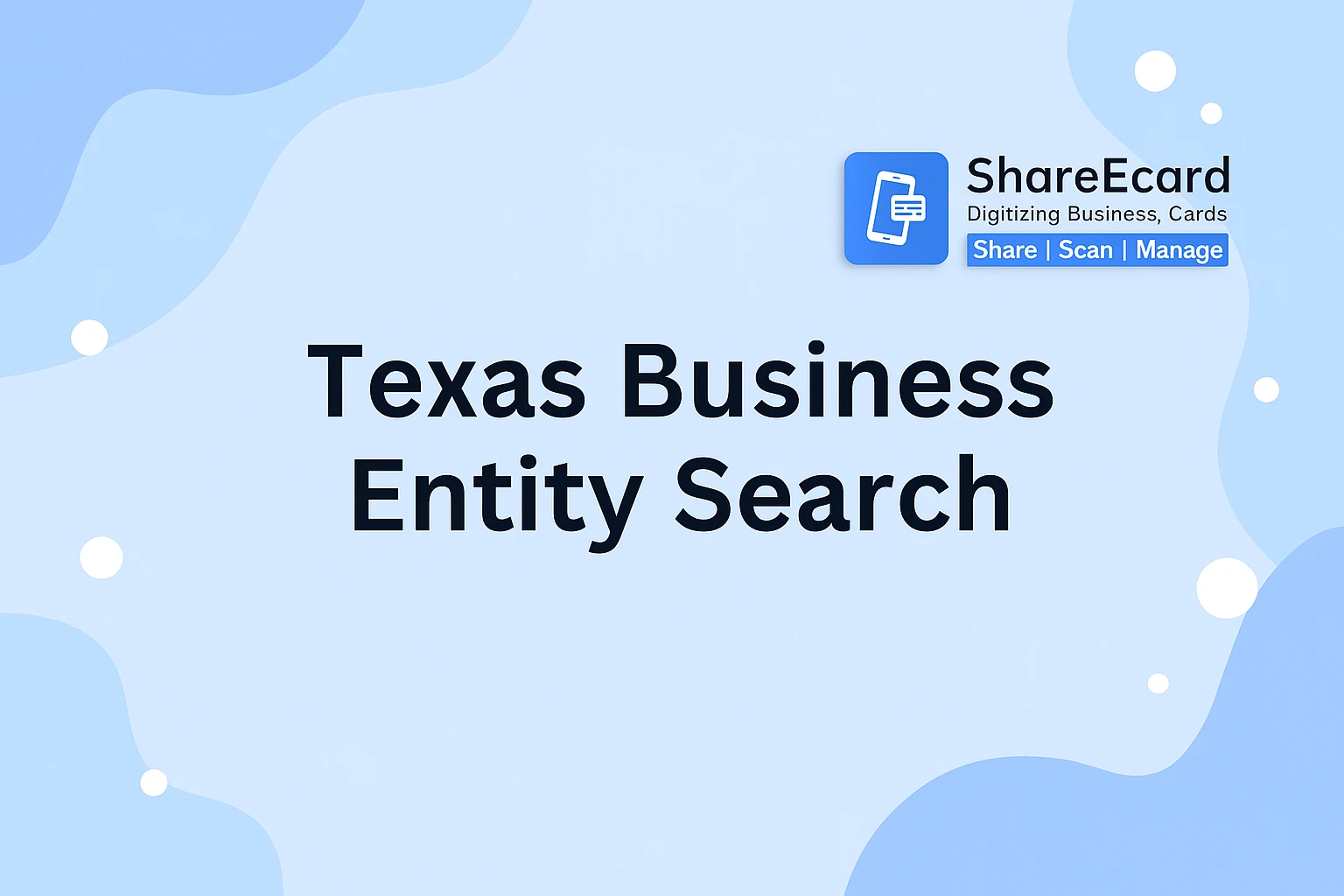Everything’s bigger in Texas, including the opportunities for business—and the complexity of state compliance. Whether you’re verifying a company’s legitimacy, planning your new venture, or managing an existing entity, the Texas Business Entity Search through SOS Direct is your command center. This comprehensive guide will help you navigate everything from simple lookups to complex franchise tax requirements.
Understanding the Texas Business Landscape
Before diving into searches and formations, it’s crucial to understand the Texas business environment. The Texas Secretary of State oversees all business entities through their SOS Direct system, while the Texas Comptroller handles tax obligations including the crucial franchise tax.
Key Texas Business Structures:
- Limited Liability Companies (LLCs): The most popular choice for small businesses
- Corporations: Including C-corps, S-corps, and professional corporations
- Nonprofit Organizations: Including 501(c)(3) entities
- Sole Proprietorships: Simple but with unlimited personal liability
- Partnerships: General and limited partnership arrangements
Mastering the Texas Business Entity Search
The Texas Business Entity Search (often called SOS Direct) is your gateway to verifying business information and conducting due diligence.
Search Methods Available:
- Entity Name Search: Perfect for general business search Texas operations
- File Number Search: Most accurate method using state-assigned numbers
- Registered Agent Search: Find all entities represented by specific Texas registered agents
- Taxable Entity Search: Specialized search for taxable entity search Texas
What You’ll Discover in Search Results:
- Current entity status and history
- Registered agent information and office address
- Formation documents including certificate of formation Texas
- Officer and director information
- Franchise tax compliance status
- Any assumed names (DBA Texas) on file
The Texas LLC Formation Process: A Step-by-Step Guide
How to get a LLC in Texas involves several crucial steps that many entrepreneurs overlook.
Step 1: Name Selection and Reservation
Before filing anything, conduct a thorough Texas LLC name search to ensure availability. Consider these naming requirements:
- Must include “LLC” or “Limited Liability Company”
- Cannot be confusingly similar to existing entities
- Must comply with Texas naming conventions
Use the Texas business name availability search tool to verify your chosen name. For additional protection, consider Texas trademark search for brand protection.
Step 2: Appoint Your Registered Agent
Every Texas entity must maintain a registered agent Texas with a physical address in the state. You can serve as your own registered agent or hire professional registered agent services Texas. Consider these factors:
- Commercial registered agents typically cost $100-$300 annually
- They provide privacy and ensure compliance
- They handle important legal and tax documents
Step 3: File Your Certificate of Formation
The Texas certificate of formation is your LLC’s birth certificate. You’ll need to provide:
- Entity name and purpose
- Registered agent information
- Management structure (member-managed vs manager-managed)
- Principal office address
The Texas LLC filing fee is currently $300 for online filings. Many entrepreneurs use Texas LLC formation services to ensure proper completion.
Step 4: Create Your Operating Agreement
While not filed with the state, an operating agreement LLC Texas is crucial for:
- Defining member roles and responsibilities
- Establishing profit distribution methods
- Creating procedures for adding/removing members
- Protecting your limited liability status
Step 5: Obtain Your EIN and Tax IDs
You’ll need an Employer Identification Number (EIN) from the IRS and potentially a Texas sales tax permit if selling taxable goods or services.
Understanding Texas Tax Obligations
Franchise Tax Requirements:
The Texas franchise tax applies to most entities doing business in Texas. Key considerations:
- What is franchise tax in Texas? It’s a privilege tax for the right to do business
- Texas franchise tax rate varies by entity type and revenue
- When is franchise tax due in Texas? Typically May 15th annually
- Texas franchise tax threshold exempts many small businesses
Other Tax Considerations:
- Sales tax permit Texas for retail businesses
- Texas resale certificate for wholesale purchases
- Texas sellers permit requirements
- Texas wholesale license obligations
Maintaining Your Texas Business Compliance
Annual Requirements:
- Texas annual report filing (combined with franchise tax report)
- Maintaining your registered agent information
- Keeping business records current
Common Compliance Tasks:
- File LLC correction Texas when errors are discovered
- Change registered agent Texas when necessary
- Texas LLC amendment filing for structural changes
- How to dissolve an LLC in Texas when closing business
Advanced Texas Business Considerations
Assumed Names (DBA Texas):
If operating under a name different from your legal entity name, you’ll need to file an assumed name certificate Texas. This involves:
- DBA search Texas to ensure name availability
- DBA filing Texas with county and/or state
- DBA renewal Texas every 10 years
Professional Entities:
For licensed professionals, Texas offers:
- PLLC Texas for professional limited liability companies
- Professional corporation options
- Specific Texas business licenses for regulated professions
Nonprofit Formation:
How to start a nonprofit in Texas involves additional steps:
- 501(c)(3) Texas application with IRS
- Texas nonprofit corporation formation
- State tax exemption applications
- Specific compliance requirements
Troubleshooting Common Texas Business Issues
Compliance Problems:
- Reinstating a revoked entity
- Correcting Texas certificate of formation errors
- Addressing franchise tax delinquencies
- Updating outdated officer information
Operational Challenges:
- Adding members to LLC in Texas
- Changing LLC address Texas
- Converting business structures in Texas
- Merging Texas entities
Texas Business Resources and Support
Government Agencies:
- Texas Secretary of State for entity management
- Texas Comptroller for tax matters
- Texas Workforce Commission for employment issues
- Local county clerks for DBA registration
Professional Services:
- Texas LLC formation services for entity setup
- Registered agent services Texas for compliance
- Business attorney Texas for legal matters
- CPA Texas for tax planning
Cost Analysis: Texas Business Formation
Initial Costs:
- Texas LLC filing fee: $300 state fee
- Registered agent Texas: $100-$300 annually
- DBA Texas cost: $25-$50 per county
- Professional services: $500-$2,000
Ongoing Costs:
- Texas franchise tax (if applicable)
- Registered agent fees
- Texas annual report no fee but required
- Business license Texas renewals
Conclusion: Building Success in the Lone Star State
The Texas Business Entity Search system provides the foundation for all your business activities in Texas. From initial Texas company search operations to complex franchise tax compliance, understanding these systems is crucial for success.
Whether you’re performing a simple Texas corporation lookup or navigating the complexities of nonprofit formation, the SOS Direct system and Comptroller’s office provide the tools you need. Remember that while the initial Texas LLC cost might seem significant, proper formation and compliance prevent much costlier problems down the road.
The Texas business landscape offers tremendous opportunity, and with this comprehensive guide, you’re equipped to navigate it successfully.
FAQ
Q1: How much does an LLC cost in Texas?
The Texas LLC cost includes a $300 state filing fee, plus optional costs for registered agent services ($100-$300 annually) and professional assistance. The LLC cost in Texas is moderate compared to other states.
Q2: Do I need a business license in Texas?
Texas business license requirements vary by location and industry. While Texas doesn’t have a general state business license, most cities require local permits, and many professions require specific licenses.
Q3: How do I get a certificate of good standing in Texas?
You can request a Texas certificate of good standing through SOS Direct. Your entity must be in compliance with all franchise tax and reporting requirements to qualify.
Q4: What is the difference between a DBA and LLC in Texas?
A DBA Texas (assumed name) lets you operate under a different name but provides no liability protection. A Texas LLC creates a separate legal entity that protects your personal assets from business debts.
Q5: How do I close my Texas LLC?
To dissolve an LLC in Texas, you must file a Certificate of Termination with the Secretary of State, settle all franchise tax obligations, and formally wind up business affairs.
Read More:




